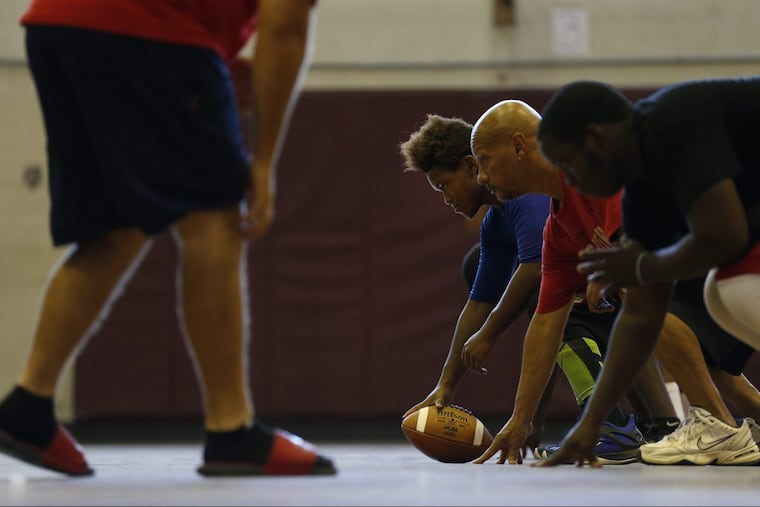Strawberry Mansion HS, nearly empty, is being phased out. What's next?
With fewer than 300 students in a high school built for 1,700, Strawberry Mansion High School will be phased out. A plan to repurpose the complex as a center for alternative education programs has a powerful backer: City Council President Darrell L. Clarke.

With fewer than 300 students occupying a hulking complex built for 1,700, Strawberry Mansion High School's days as a comprehensive school are numbered.
Come September, there will be no new ninth graders at the school, which counts the rapper Meek Mill among its alumni. Strawberry Mansion will graduate its final class in 2021.
But the building will not close, the Philadelphia School District says. Instead, it will get repurposed as an alternative education center, with a night school and accelerated school locating there beginning in the fall. In the future, other programs could land there as well, including workforce development and those patterned after the district's Workshop School, which encourages project-based learning, and YouthBuild, a program that reengages students who have dropped out.
The community, which is now seeing signs of gentrification, will be briefed on the project Wednesday night at a meeting at the school.
The project has a powerful ally: Council President Darrell L. Clarke, who five years ago joined the community to fight against a planned closure of Strawberry Mansion.
"I think it's a reasonable approach," said Clarke. "I relish the fact that we can have more successful programs in the Strawberry Mansion community."
One thing is clear, said Clarke, who attended Strawberry Mansion for junior high: "There's no way in the world that I'm going to let it close."
But continuing the school in its current state is not possible, district officials said. "A comprehensive high school program at Strawberry Mansion is no longer sustainable," reads a slide to be presented to the community Wednesday.
Built in 1964, the school that once graduated hundreds had 394 total students in 2015-16, and was down to 294 as of Oct. 1. And despite some academic interventions — it was a "Promise Academy" for a time, and then was placed in the district's "Turnaround Network," with more supports and scrutiny — it has struggled. Last year, it scored just 5 out of 100 on the School Progress Report, an internal measure of academics, climate and culture. Its graduation rate hovers around 50 percent. About 87 percent of its students live in poverty.
In 2013, it was featured in an ABC World News report with Diane Sawyer, and decried as one of the most dangerous high schools in the country.
Seventy-five percent of high school students in Strawberry Mansion's catchment area go to other high schools, and because enrollment is so low, "there is not access to a full set of high school opportunities," according to district documents.
Students who would have attended Strawberry Mansion, at 31st Street and Ridge Avenue, for their freshman year will be routed to other options in consultation with their families, and feeder patterns will be redrawn, officials said. The School Reform Commission is scheduled to vote on a resolution in June to eliminate ninth grade at Strawberry Mansion.
Joe Antonio, the school system's director of school transitions, said the plan would be the least disruptive to students while still recognizing the building's important role in the community.
"The overall vision is to bring more academic and community programming into the Strawberry Mansion complex," Antonio said. "It's currently way underutilized."
Antonio said the district was close to locating an accelerated school provider for the complex and would work in the future to attract appropriate tenants for other parts of the space.
The coming end to her school program saddens Novilette Jones, a 1993 alumna of Strawberry Mansion.
"It was a great all-around school," said Jones. "I would love for it to stay open as it was."
Judith Robinson, a North Philadelphia community activist, said she's a realist, but she believes not enough was done to try to salvage the current Strawberry Mansion program.
"We understand change, and we understand that the school is large and needs to be filled up," she said. "But they set us up for failure. They've not done much to support the efforts of trying to turn the school around."
Robinson is frustrated that a proposal was formulated behind the scenes and then presented to the community as fact before it had been widely aired. But still, her ears are open. She'll attend the Wednesday meeting, and will be part of the plan if she thinks it has merit.
"But many projects are going on, and they had better not want to shut down our history as the community is gentrifying," said Robinson.
Andria Moore, president of the Strawberry Mansion alumni association, has been very involved at the school, with her organization paying for class dues, prom expenses, and even college deposits for a dwindling number of seniors — no more than 50 this year, fewer than 70 last year.
Still, Moore said, "this was a shock."
"Our focus," she said, "is, how do we continue to help our students? What is the picture going to look like for current Strawberry Mansion students? How does this benefit the community?"